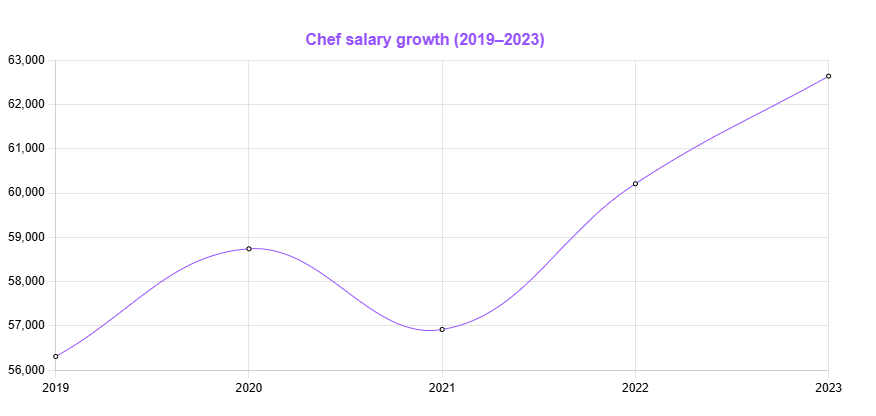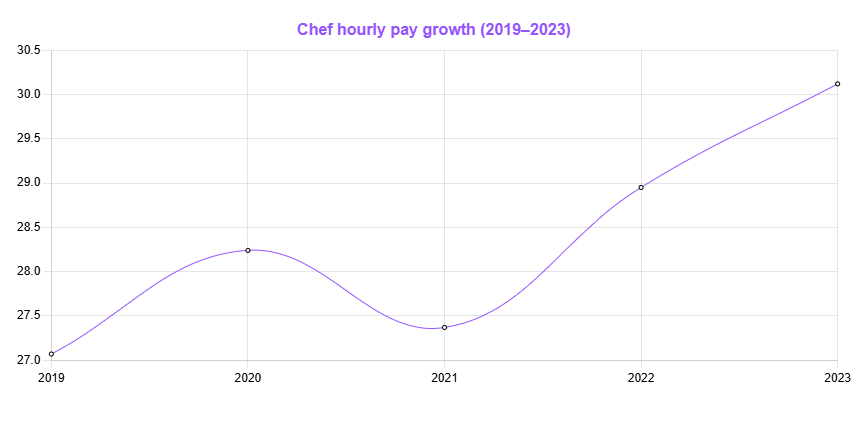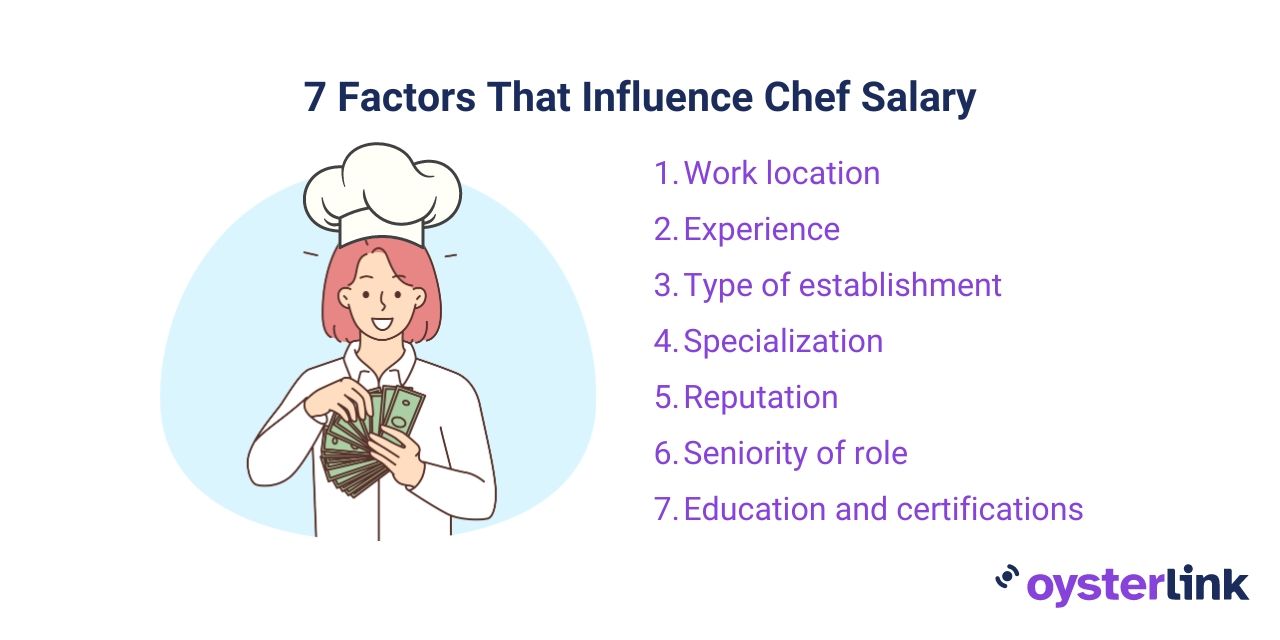Chef Salary in the United States in 2025
Chef Salary Trends by Year
The Bureau of Labor and Statistics reported Chef salary averages from $36,040 to $93,900 per year, averaging $62,640 plus tips per year. Since 2019, Chef salary averages have shown an increasing trend, rising by 11% since 2019 — despite the slight dip in 2021.

[Source: BLS]
Average Chef Salary Per Month
Chefs earn an average salary of $5,220 per month. Most establishments follow a monthly (or bi-weekly) timeline for Chefs to receive their pay.
Average Chef Salary Per Week
A freelance or Private Chef can have even more flexible payment schedules as they usually depend on mutual agreements or contracts between the Chef and their client.
Average Chef Salary Per Hour
The hourly pay for Chefs is $30.12, increasing by $3.05 since 2019. This is the national average, ranging from the lowest-paid Chefs’ average of $17.33 to the highest-paid Chefs’ average of $45.14.

[Source: BLS]
Use our Salary to Hourly Calculator below to learn more about your Chef salary and plan your finances more wisely. All salaries listed in this article were determined using our salary data methodology.
High-Paying States and Districts for Chefs
Location is one of several factors that affect Chef salary. For instance, Hawaii, Rhode Island and Massachusetts are the top three paying states, with annual average salaries of $99,520, $81,170 and $77,120.
This is mainly because of the higher cost of living, including housing, food and services, compared to other states.
Chefs earn $1,204.62 weekly. Some restaurants offer weekly pay instead of monthly, and some even offer daily pay access.
Discover the average Chef salary in all other states in the table below. You can also rearrange the table from highest to lowest salary and vice versa.
Chef Salary in Major US Cities
Among these four major U.S. cities, New York City offers the highest Chef salary average at $70,060 per year, followed by Los Angeles, Chicago and Miami.
[Source: BLS]
7 Factors That Affect Average Chef Salary
Chefs must consider several factors to ensure they get the best salary for their skills and experience. Read on to learn the seven key factors that can influence your Chef’s salary amount.

1. Work location
As mentioned, major cities and top states often pay a higher Chef salary given the higher standards and increased demand for upscale dining experiences. Meanwhile, Chefs in smaller towns or rural areas often earn less.
See the table below for the average annual Chef salaries per state.
2. Experience
Your years of experience in the kitchen play a key role in determining your pay. Chefs with more years of experience often command higher salaries. This is also the case for those who have held leadership positions.
Hiring Managers often positively relate experience to a candidate’s skills, knowledge of their job as a Chef and leadership prowess. To really get the highest pay available for Chefs, you need to get ready to invest years into this career.
3. Type of establishment
If you’re working as a Chef in high-end restaurants, luxury hotels or exclusive resorts, you are likely to earn much more money than other Chefs working in casual dining or smaller, independent eateries.
Larger establishments often have larger budgets, a bigger clientele and higher customer expectations — which often translate into higher pay for top talent.
4. Specialization
As a Chef, you need to specialize in certain cuisines or techniques to command higher wages. Having a unique skillset can set you apart from others.
For example, expertise in molecular gastronomy, pastries, sushi or Middle Eastern cuisine enhances your skillset and makes you stand out among other Chefs in the culinary industry looking for employment at high-end restaurants.
Check out our Sushi Chef career guide and our Pastry Chef career guide.
5. Reputation
Chefs who have won awards, received media attention or built a loyal following can often negotiate better salaries. A well-known reputation enhances your brand and can attract higher-paying opportunities.
Discover how some well-renowned Chefs started their careers and steadily built a reputation in the culinary industry in our interviews below:

- Interview with Chef Robb Garceau (Director of Culinary at New York Hospitality Group)
- Interview with Chef Mat Meyer (Head Chef and Founder of Ansley Table)
- Interview with Hanalei Souza (Sous Chef of LADYLINECOOK)
6. Seniority of role
Holding a management position, such as an Executive Chef or Head Chef, typically leads to higher salaries. These roles come with increased responsibilities, including managing staff, planning menus and overseeing kitchen operations.
The added leadership duties justify the much higher salary associated with these positions.
Keep in mind that there are many different types of Chefs, and each has its own set of duties — with higher-level positions requiring a greater sense of responsibility.
7. Education and certifications
Graduating from a prestigious culinary school or earning certifications in food safety, nutrition or specific cooking techniques can make you more competitive in the Chef job market. Employers often reward Chefs with specialized job training, viewing them as more qualified for high-paying roles.
Keep in mind that formal education and certifications only give you a steady foundation. They should be complemented with hands-on experience to become a high-value Chef.
How Much Do High Chef Positions Pay?
Testimonial From Successful Chef Wissam Baki
What advice would you offer to someone who’s starting out, based on your own early career challenges?
The biggest challenge for everyone in our industry has always been having patience with people. But also, the Chef role involves many aspects — for example, understanding market demands and keeping up with industry trends.
Success in our field is not defined by just making money; true passion and commitment are essential, or you won’t last long in the kitchen.
Read the complete interview with Chef Wissam Baki here.




